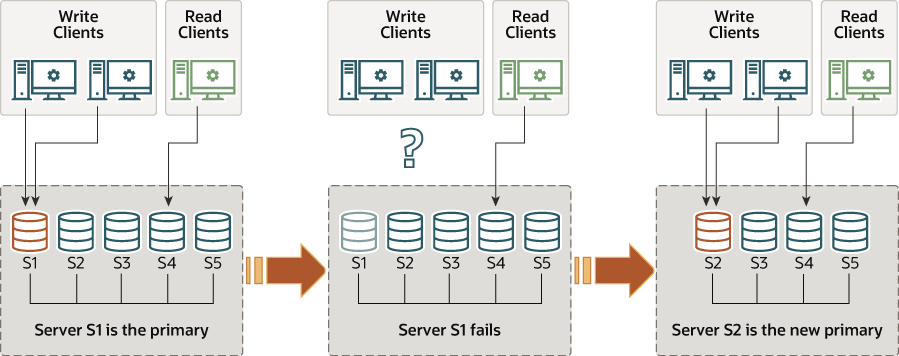In single-primary mode
(group_replication_single_primary_mode=ON)
the group has a single primary server that is set to read/write
mode. All the other members in the group are set to read-only
mode (with super_read_only=ON).
The primary typically bootstraps the entire group. All other
servers that join the group learn about the primary server and
are automatically set to read-only mode.
In single-primary mode, Group Replication enforces that only a
single server writes to the group, so compared to multi-primary
mode, consistency checking can be less strict and DDL statements
do not need to be handled with any extra care. The option
group_replication_enforce_update_everywhere_checks
enables or disables strict consistency checks for a group. When
deploying in single-primary mode, or changing the group to
single-primary mode, this system variable must be set to
OFF.
The member that is designated as the primary server can change in the following ways:
If the existing primary leaves the group, whether voluntarily or unexpectedly, a new primary is elected automatically.
You can appoint a specific member as the new primary using the
group_replication_set_as_primary()function.If you use the
group_replication_switch_to_single_primary_mode()function to change a group that was running in multi-primary mode to run in single-primary mode, a new primary is elected automatically, or you can appoint the new primary by specifying it with the function.
These functions can be used only when all group members are running MySQL 8.0.13 or later.
When a new primary server is elected (automatically or manually), it is automatically set to read/write, and the other group members remain as secondaries, and as such, read-only. The following diagram shows this process:
When a new primary is chosen, it might have a backlog of changes
that had been applied on the old primary but have not yet been
applied on the new one. In this case, until the new primary
catches up with the old one, read/write transactions might
result in conflicts and be rolled back, and read-only
transactions might result in stale reads. The Group Replication
flow control mechanism minimizes the difference between fast and
slow members, and so reduces the chances of this happening if it
is activated and properly tuned. For more information on flow
control, see Section 20.7.2, “Flow Control”.
In MySQL 8.0.14 and later, you can also use the
group_replication_consistency
system variable to set the group's level of transaction
consistency to prevent this issue. Setting this variable to
BEFORE_ON_PRIMARY_FAILOVER (the default) or
any higher consistency level holds new transactions on a newly
elected primary until the backlog has been applied.
For more information on transaction consistency, see Section 20.5.3, “Transaction Consistency Guarantees”. If flow control and transaction consistency guarantees are not used for a group, it is a good practice to wait for the new primary to apply its replication-related relay log before re-routing client applications to it.
The automatic primary member election process involves each member looking at the new view of the group, ordering the potential new primary members, and choosing the member that qualifies as the most suitable. Each member makes its own decision locally, following the primary election algorithm in its MySQL Server release. Because all members must reach the same decision, members adapt their primary election algorithm if other group members are running lower MySQL Server versions, so that they have the same behavior as the member with the lowest MySQL Server version in the group.
The factors considered by members when electing a primary, in order, are as follows:
The first factor considered is which member or members are running the lowest MySQL Server version. If all group members are running MySQL 8.0.17 or higher, members are first ordered by the patch version of their release. If any members are running MySQL 5.7, or MySQL 8.0.16 or earlier, members are first ordered by the major version of their release, and the patch version is ignored.
If more than one member is running the lowest MySQL Server version, the second factor considered is the member weight of each of those members, as specified by the
group_replication_member_weightsystem variable on the member. If any member of the group is running MySQL Server 5.7, where this system variable was not available, this factor is ignored.The
group_replication_member_weightsystem variable specifies a number in the range 0-100. All members default to a weight of 50, so set a weight below this to lower their ordering, and a weight above it to increase their ordering. You can use this weighting function to prioritize the use of better hardware or to ensure failover to a specific member during scheduled maintenance of the primary.If more than one member is running the lowest MySQL Server version, and more than one of those members has the highest member weight (or member weighting is being ignored), the third factor considered is the lexicographical order of the generated server UUIDs of each member, as specified by the
server_uuidsystem variable. The member with the lowest server UUID is chosen as the primary. This factor acts as a guaranteed and predictable tie-breaker so that all group members reach the same decision if it cannot be determined by any important factors.
To find out which server is currently the primary when
deployed in single-primary mode, use the
MEMBER_ROLE column in the
performance_schema.replication_group_members
table. For example:
mysql> SELECT MEMBER_HOST, MEMBER_ROLE FROM performance_schema.replication_group_members;
+-------------------------+-------------+
| MEMBER_HOST | MEMBER_ROLE |
+-------------------------+-------------+
| remote1.example.com | PRIMARY |
| remote2.example.com | SECONDARY |
| remote3.example.com | SECONDARY |
+-------------------------+-------------+
The group_replication_primary_member
status variable has been deprecated; expect it to be removed
in a future version.
Alternatively use the
group_replication_primary_member
status variable, like this:
mysql> SHOW STATUS LIKE 'group_replication_primary_member'
